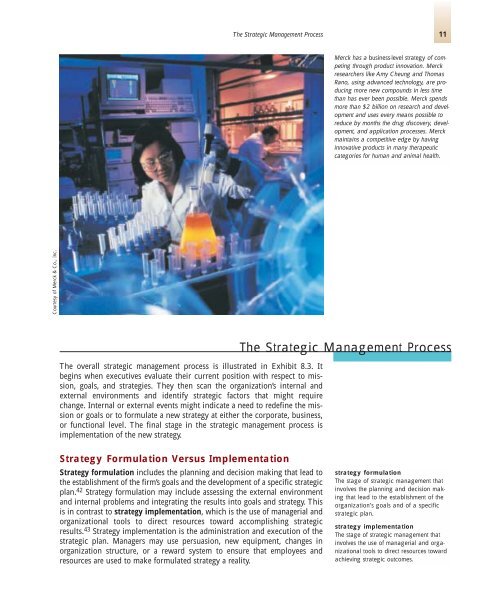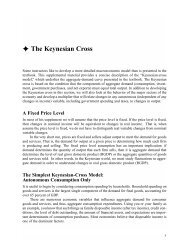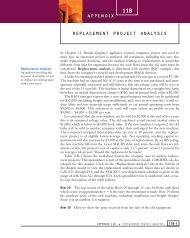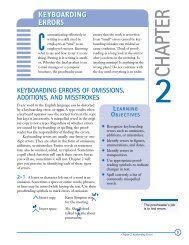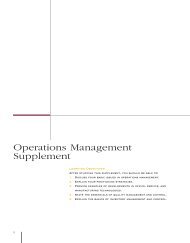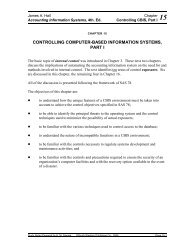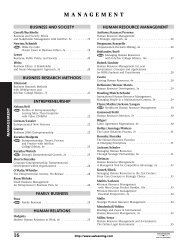chapter 8: strategy formulation and implementation
chapter 8: strategy formulation and implementation
chapter 8: strategy formulation and implementation
Create successful ePaper yourself
Turn your PDF publications into a flip-book with our unique Google optimized e-Paper software.
Courtesy of Merck & Co., Inc.<br />
The overall strategic management process is illustrated in Exhibit 8.3. It<br />
begins when executives evaluate their current position with respect to mission,<br />
goals, <strong>and</strong> strategies. They then scan the organization’s internal <strong>and</strong><br />
external environments <strong>and</strong> identify strategic factors that might require<br />
change. Internal or external events might indicate a need to redefine the mission<br />
or goals or to formulate a new <strong>strategy</strong> at either the corporate, business,<br />
or functional level. The final stage in the strategic management process is<br />
<strong>implementation</strong> of the new <strong>strategy</strong>.<br />
Strategy Formulation Versus Implementation<br />
Strategy <strong>formulation</strong> includes the planning <strong>and</strong> decision making that lead to<br />
the establishment of the firm’s goals <strong>and</strong> the development of a specific strategic<br />
plan. 42 Strategy <strong>formulation</strong> may include assessing the external environment<br />
<strong>and</strong> internal problems <strong>and</strong> integrating the results into goals <strong>and</strong> <strong>strategy</strong>. This<br />
is in contrast to <strong>strategy</strong> <strong>implementation</strong>, which is the use of managerial <strong>and</strong><br />
organizational tools to direct resources toward accomplishing strategic<br />
results. 43 Strategy <strong>implementation</strong> is the administration <strong>and</strong> execution of the<br />
strategic plan. Managers may use persuasion, new equipment, changes in<br />
organization structure, or a reward system to ensure that employees <strong>and</strong><br />
resources are used to make formulated <strong>strategy</strong> a reality.<br />
The Strategic Management Process 11<br />
Merck has a business-level <strong>strategy</strong> of competing<br />
through product innovation. Merck<br />
researchers like Amy Cheung <strong>and</strong> Thomas<br />
Rano, using advanced technology, are producing<br />
more new compounds in less time<br />
than has ever been possible. Merck spends<br />
more than $2 billion on research <strong>and</strong> development<br />
<strong>and</strong> uses every means possible to<br />
reduce by months the drug discovery, development,<br />
<strong>and</strong> application processes. Merck<br />
maintains a competitive edge by having<br />
innovative products in many therapeutic<br />
categories for human <strong>and</strong> animal health.<br />
The Strategic Management Process<br />
<strong>strategy</strong> <strong>formulation</strong><br />
The stage of strategic management that<br />
involves the planning <strong>and</strong> decision making<br />
that lead to the establishment of the<br />
organization’s goals <strong>and</strong> of a specific<br />
strategic plan.<br />
<strong>strategy</strong> <strong>implementation</strong><br />
The stage of strategic management that<br />
involves the use of managerial <strong>and</strong> organizational<br />
tools to direct resources toward<br />
achieving strategic outcomes.


